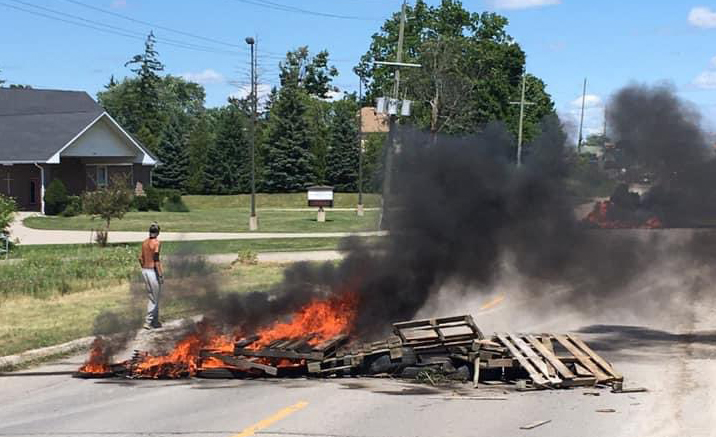Image Caption
Summary
Local Journalism Initiative Reporter
Windspeaker.com

A number of fires were set on roadways following the arrest by the Ontario Provincial Police of about seven land defenders from the McKenzie Meadows construction site in Caledonia on the morning of Aug. 5.
The land defenders from Six Nations of the Grand River had pitched tents in the area in mid-July to protest an agreement made by Chief Mark B. Hill and council to allow Foxgate Developments Inc. to build on the land.
The deal reached saw Foxgate accommodate Six Nations Elected Council with 42.85 acres of farmland and $352,000. The deal was not sent to Six Nations members for approval.
Live streaming on numerous Facebook pages, including that of Skyler Williams and 1492 Land Back Lane, showed tire fires in a number of locations, including the Highway 6 bypass and Argyle Street.
An unnamed woman comments on William’s Facebook page that “this new fire that has taken place on Argyle Street is a result of the OPP coming in and removing land defenders stopping a housing development (at) 1492 Land Back Lane … and community has now started a fire on the road.”
Williams also livestreamed the OPP apprehending the protesters. Commentary by the same woman following the apprehensions, stated, “The cops … rolled up pretty heavy, blocked access to the road, and began arresting protestors… I believe there were three paddy wagons of land defenders that were taken … from their traditional territory by force.”
A YouTube post with an unnamed member of the Six Nations indicated that rubber bullets were used during the apprehension and that people “were punched in the face by the cops.” He said that about 100 police officers were present.
On July 31, the police delivered a court injunction to the people on site, which ordered them to remove their structures, stop disrupting the work and leave. The OPP returned Wednesday morning to remove them.
According to a statement posted on Haldimand County Council site, “Protestors on site are not supported by Six Nations of the Grand River governing bodies.”
Those same "protesters" don’t see the Six Nations of the Grand River chief and council as the rightful governing body, but instead as a “product of the of the Canadian government’s Indian Act … (and) as a Federal Government entity the band council doesn’t hold any treaty rights, inherent rights, legitimate authority, over Onkwehon:we people to make decisions regarding their lands and rights,” as posted in realpeoples.media.
The land in question has a deep history.
“It’s in the Grand River tract. I’m familiar with the claim. It’s a tract of land that runs about a mile each side of the Grand River right down to Lake Erie. And they’ve lost over 90 per cent of it through improper, illegal sales to where they just have the existing Six Nations reserve today,” said Russ Diabo, an Indigenous policy analyst who has both worked for the Assembly of First Nations and ran unsuccessfully last election for the position of national chief.
The land targeted by the defenders has a more recent history. The area was purchased by McKenzie Meadows development in 2003. The Douglas Creek Estates development planned for the land never happened as the Onkwehon:we people protested. In 2013, the developers of the McKenzie Meadows site proposed a two-phased residential development. In exchange Six Nations would receive 700 to 1,000 residential units worth $875,000 to $1,250,000. The membership voted down the proposal.
“To let this (latest) project proceed (and) … they didn’t consult the people when they made that agreement. That’s pretty dangerous for band councils to do when it deals with land,” said Diabo.
He also points out that the battle being fought by the land defenders in Six Nations is only one part of a larger picture.
“It’s the broader issue about the Grand River tract which is outstanding,” said Diabo. “The (federal government) do consider it a specific claim.”
According to the Six Nations Lands Resources site, the Haldimand Tract is one of the claims submitted by Six Nations as a specific claim. Specific claims are defined as an unfulfilled treaty or agreement between Canada and First Nations.
“I’m concerned about all the issues regarding land and land back. I’ve been a critic of the Trudeau government. They’re misleading people through this rhetoric of reconciliation and Nation-to-Nation when really they’re just continuing with the same old land claims policies and self-government policies from previous governments just under new rhetoric,” said Diabo.
He points to the United Declaration on the Rights of Indigenous Peoples, signed by Canada. Article 27 calls for Indigenous peoples to have the right to participate in the process of the establishment and implementation of “a fair, independent, impartial, open and transparent process, giving due recognition to Indigenous peoples’ laws, traditions, customs and land tenure systems, to recognize and adjudicate the rights of Indigenous peoples pertaining to their lands, territories and resources, including those which were traditionally owned or otherwise occupied or used.”
“This situation here is all connected to that,” said Diabo.
Skyler Williams and Chief Mark Hill did not return requests for interviews.

